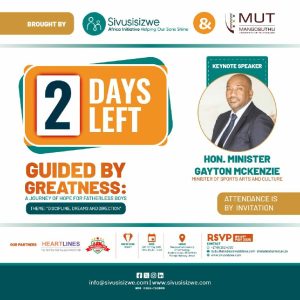 While reports of the University’s community engagement division focussing on formal and organised sections of the population abound, it is also true that CEAD also considers those members of the society that are usually on the periphery, to give them love and much-needed guidance. Some of those members of the society are boys without fathers. This year the CEAD has an extensive programme for these boys. On 10 May 2025, the CEAD, with its partners, will have what it has described as a “high profile” youth empowerment event under the theme: Guided by greatness: a journey of hope for fatherless boys. As has become a norm, the CEAD will continue to partner with a Durban-based NPO, Sivusisizwe Africa Initiative, an organisation that was launched by single mothers raising sons in the absence of their biological fathers. Aptly named Sivusisizwe, an IsiZulu name which means “rebuilding the nation”, the programme aims to inspire and unlock the full potential of fatherless adolescent boys and young men and to empower single mothers to raise their sons in a supportive and resourceful environment.
While reports of the University’s community engagement division focussing on formal and organised sections of the population abound, it is also true that CEAD also considers those members of the society that are usually on the periphery, to give them love and much-needed guidance. Some of those members of the society are boys without fathers. This year the CEAD has an extensive programme for these boys. On 10 May 2025, the CEAD, with its partners, will have what it has described as a “high profile” youth empowerment event under the theme: Guided by greatness: a journey of hope for fatherless boys. As has become a norm, the CEAD will continue to partner with a Durban-based NPO, Sivusisizwe Africa Initiative, an organisation that was launched by single mothers raising sons in the absence of their biological fathers. Aptly named Sivusisizwe, an IsiZulu name which means “rebuilding the nation”, the programme aims to inspire and unlock the full potential of fatherless adolescent boys and young men and to empower single mothers to raise their sons in a supportive and resourceful environment.
In 2023 the University committed to support the boys’ programme. Over the past two years, the CEAD has helped enrich the programme through skills transfer and the provision of various resources to sustain it. This partnership enabled Sivusisizwe to run a school holiday camp in 2023 and to hold multiple events in 2024, where positive role models inspired learners to participate in primary and high schools, allowing them to learn from their experiences.
In 2025, the partners have expanded the programme to include more organisations. These include Heartlines, who will present on “why fathers matter”, and Inkonjane, whose presentation will be on “mentorship through sport”. There will also be a young man from Limpopo. He is called “Limpopo Boy”. His real name is Matome Robert Mahlatse. Mahlatse is a dancer and choreographer who has taken South Africa’s dance styles to the world. There will also be Minister of Sport and Culture Gayton McKenzie, who will be the keynote speaker.
MUT’s CEAD is not the only one that is shining some light on the fatherless boys’ problem. Heartlines Father Matter Project says that almost 70% of children in South Africa grow up without a biological father present in the home. Sivusisizwe Africa Initiative reports that Black children are least likely to stay with both parents at home, with only 31,7% of children, from birth to 17 years, staying with both parents; and that KwaZulu-Natal has the highest proportion of children living with single mothers. The proportion is at 51,2%.
